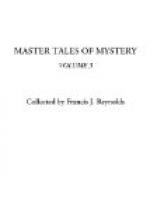“Huh!” exclaimed DeLong in disgust. “Suppose you were in for some thousands—you wouldn’t quit. If you had real sporting blood you wouldn’t quit, anyhow!”
Kennedy calmly passed over the open insult, letting it be understood that he ignored this beardless youth.
“There is no way you can beat the game in the long run if you keep at it,” he answered simply. “It is mathematically impossible. Consider. We are Croesuses—we hire players to stake money for us on every possible number at every coup. How do we come out? If there are no ‘0’ or ‘00,’ we come out after each coup precisely where we started—we are paying our own money back and forth among ourselves; we have neither more nor less. But with the ‘0’ and ‘00’ the bank sweeps the board every so often. It is only a question of time when, after paying our money back and forth among ourselves, it has all filtered through the ‘O’ and ‘OO’ into the bank. It is not a game of chance for the bank—ah, it is exact, mathematical—c’est une question d’arithmetique seulement, n’est-ce pas, messieurs?”
“Perhaps,” admitted DeLong, “but it doesn’t explain why I am losing to-night while everyone else is winning.”
“We are not winning,” persisted Craig. “After I have had a bite to eat I will demonstrate how to lose—by keeping on playing.” He led the way to the cafe.
DeLong was too intent on the game to leave, even for refreshments. Now and then I saw him beckon to an attendant, who brought him a stiff drink of whiskey. For a moment his play seemed a little better, then he would drop back into his hopeless losing. For some reason or other his “system” failed absolutely.
“You see, he is hopeless,” mused Kennedy over our light repast. “And yet of all gambling games roulette offers the player the best odds, far better than horse-racing, for instance. Our method has usually been to outlaw roulette and permit horse-racing; in other words, suppress the more favorable and permit the less favorable. However, we’re doing better now; we’re suppressing both. Of course what I say applies only to roulette when it is honestly played—DeLong would lose anyhow, I fear.”
I started at Kennedy’s tone and whispered hastily: “What do you mean? Do you think the wheel is crooked?”
“I haven’t a doubt of it,” he replied in an undertone. “That run of ‘17’ might happen—yes. But it is improbable. They let me win because I was a new player—new players always win at first. It is proverbial, but the man who is running this game has made it look like a platitude. To satisfy myself on that point I am going to play again—until I have lost my winnings and am just square with the game. When I reach the point that I am convinced that some crooked work is going on I am going to try a little experiment, Walter. I want you to stand close to me so that no one can see what I am doing. Do just as I will indicate to you.”




